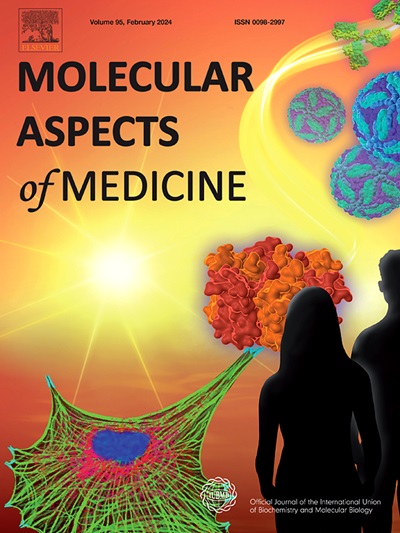The double-edged sword: How SARS-CoV-2 might fuel lung cancer: Investigating the potential oncogenic mechanisms of the novel coronavirus in lung carcinogenesis
IF 10.3
2区 医学
Q1 BIOCHEMISTRY & MOLECULAR BIOLOGY
引用次数: 0
Abstract
The COVID-19 pandemic, caused by SARS-CoV-2, has had far-reaching consequences beyond acute respiratory illness, with growing evidence suggesting potential long-term oncogenic effects. Lung cancer, a leading cause of cancer-related mortality, may intersect with COVID-19 through shared molecular pathways and altered disease dynamics. SARS-CoV-2 can exacerbate outcomes in existing cancer patients and potentially contribute to de novo lung carcinogenesis or accelerate progression via chronic inflammation, oxidative stress, immune dysregulation, cellular senescence, cell cycle disruption, metabolic reprogramming, and autophagy impairment. It has been proven that although the SARS virus is not capable of integrating into the host genome, it uses the mechanisms of other human oncoviruses to cause lung cancer. Post-COVID-19 pulmonary fibrosis, observed in up to one-third of severe cases, may act as a tumor precursor bridge through sustained tissue remodeling, extracellular matrix stiffness, and hypoxia-induced epithelial-mesenchymal transition. Epidemiological studies indicate increased cancer-related mortality, metastatic reactivation of dormant cancer cells, and diagnostic delays, shifting presentations toward advanced stages during the pandemic. Synergistic risk factors, including smoking, air pollution, occupational exposures, and genetic predispositions, may further amplify oncogenic potential. The convergence of viral, environmental, and host factors creates a critical need for vigilant surveillance, biomarker development, and preventive strategies. This study aims to synthesize current epidemiological evidence, elucidate the molecular and cellular mechanisms by which SARS-CoV-2 may influence lung carcinogenesis, and highlight clinical implications to guide future research, screening, and therapeutic interventions.
双刃剑:SARS-CoV-2如何引发肺癌:研究新型冠状病毒在肺癌发生中的潜在致癌机制
由SARS-CoV-2引起的COVID-19大流行,除了急性呼吸道疾病之外,还产生了深远的影响,越来越多的证据表明其潜在的长期致癌作用。肺癌是癌症相关死亡的主要原因,可能通过共享的分子途径和改变的疾病动态与COVID-19交叉。SARS-CoV-2可加剧现有癌症患者的预后,并可能通过慢性炎症、氧化应激、免疫失调、细胞衰老、细胞周期破坏、代谢重编程和自噬损伤等途径促进新发肺癌的发生或加速进展。已经证明,虽然SARS病毒不能整合到宿主基因组中,但它利用其他人类致癌病毒的机制导致肺癌。在高达三分之一的严重病例中观察到的covid -19后肺纤维化可能通过持续的组织重塑、细胞外基质僵硬和缺氧诱导的上皮-间质转化作为肿瘤前体桥。流行病学研究表明,与癌症相关的死亡率增加,休眠癌细胞的转移性再激活,以及诊断延迟,在大流行期间将症状转移到晚期。协同风险因素,包括吸烟、空气污染、职业暴露和遗传易感性,可能进一步扩大致癌潜力。病毒、环境和宿主因素的融合产生了对警惕监测、生物标志物开发和预防策略的迫切需求。本研究旨在综合现有流行病学证据,阐明SARS-CoV-2可能影响肺癌发生的分子和细胞机制,突出临床意义,指导未来的研究、筛查和治疗干预。
本文章由计算机程序翻译,如有差异,请以英文原文为准。
求助全文
约1分钟内获得全文
求助全文
来源期刊

Molecular Aspects of Medicine
医学-生化与分子生物学
CiteScore
18.20
自引率
0.00%
发文量
85
审稿时长
55 days
期刊介绍:
Molecular Aspects of Medicine is a review journal that serves as an official publication of the International Union of Biochemistry and Molecular Biology. It caters to physicians and biomedical scientists and aims to bridge the gap between these two fields. The journal encourages practicing clinical scientists to contribute by providing extended reviews on the molecular aspects of a specific medical field. These articles are written in a way that appeals to both doctors who may struggle with basic science and basic scientists who may have limited awareness of clinical practice issues. The journal covers a wide range of medical topics to showcase the molecular insights gained from basic science and highlight the challenging problems that medicine presents to the scientific community.
 求助内容:
求助内容: 应助结果提醒方式:
应助结果提醒方式:


